Forty-four years elapsed between the time Jimmy Carter left the presidency and the day he died.
Four decades seems like a long time – a record for a former US president – yet many of the challenges facing America in 2024 are not that different from the ones Carter faced, and at times succumbed to, in the late 1970s.
The US during the Carter years faced a crisis of confidence. Americans were grappling with economic turmoil at home and a range of challenges to US power abroad. Fast forward four decades, and the players and issues are strikingly familiar – the economy and the environment, Russia, Afghanistan and the Middle East. Years have passed, the leaders have changed, but the challenges linger.
Carter celebrated the power of US diplomacy by brokering the Camp David peace agreement between Egypt and Israel in 1978, but the glow of success was fleeting. The limits of American power were painfully apparent during the Iranian hostage crisis a year later, after US embassy staff in Tehran were taken prisoner.
It took more than 12 months of intense efforts – diplomatic and military – to free them. The sense of American helplessness contributed to Carter’s resounding election loss to Ronald Reagan in 1980, with the prisoners’ eventual release coming just hours after Carter left office.
The inability to shape global events even from the world’s most powerful office continues to haunt US leaders. Current President Joe Biden’s dose of this cold reality first came during the chaotic US withdrawal from Afghanistan in 2021, which lowered the curtain on two decades of futile American nation-building and saw the Taliban sweep back into power.
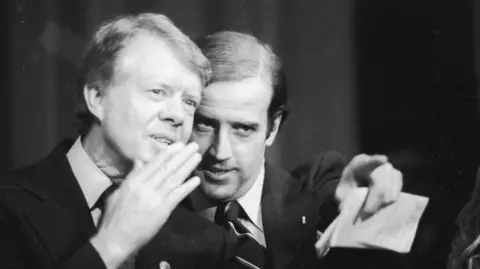 Getty Images
Getty ImagesMore recently, Biden and his diplomatic team proved unable to prevent the 7 October Hamas attack on Israel from spreading into a regional conflagration and a devastating humanitarian crisis in Gaza.
Both Carter and Biden, humbled by seemingly outmatched regional forces in Iran and Afghanistan, were also confronted by the territorial ambitions of global powers. Carter was lambasted for inadequately responding to the Soviet invasion of Afghanistan and then widely denounced for the move he did make – ordering a boycott by US athletes of the 1980 Olympics in Moscow.
Biden has had greater early success countering the invasion of Ukraine, uniting allies to support and supply Kyiv’s forces in resisting the Russian advance. But as the war drags on, American resolve has been tested. Extended bloody conflict turned Afghanistan into a cauldron of instability that eventually gave birth to al-Qaeda and a global jihad.
The lasting impact of the war in Ukraine could have its own unexpected, and deadly, consequences – all of which could be laid at this president’s feet.
In the Middle East, Carter’s Camp David triumph has proven to be an incomplete accomplishment, securing peace between Israel and Egypt but failing to resolve the Palestinian question which, with the Gaza war, has once again become an urgent global concern. For more than a year, the war has been a constant reminder of the limits of American – and Biden’s – power.
The US was unable to prevent the conflict from expanding into Lebanon and including, for the first time, direct hostilities between Iran and Israel. The latter, America’s closest ally in the region, has time and again seemingly disregarded Biden’s counsel and forged a more aggressive path on its own.
Biden also has had to handle a tense relationship with an ascendant China, whose current place in the world is due in no small part to Carter’s decision to normalise US relations with the country in 1979.
That watershed moment set a course for the country to become a major economic, and military, power – ultimately creating the geopolitical rivalry with the US with which Mr Biden has had to contend.
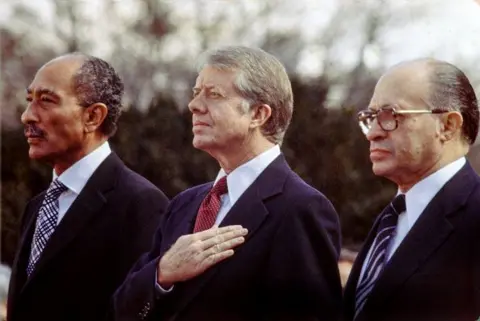 Getty Images
Getty ImagesForeign crises have a tendency to spill into domestic affairs as well, and four decades ago Carter faced environmental and energy challenges in part instigated by turmoil abroad.
While the current threat of global climate change is different than the Mid East oil embargo Carter faced, many of his policy approaches – conservation, a transition to renewable energy and government investment – served as the backbone of the environmental programme Biden helped shepherd through Congress in 2022.
The spectre of runaway inflation that the US recently faced also harkens back to the Carter years. The double-digit spikes in consumer prices over the first two years of Biden’s presidency, enflamed by the shock of the global Covid pandemic and the war in Ukraine, was a reminder of the darkest days of the late 1970s.
The one key difference was that, unlike Carter’s situation, job growth remained robust and the US economy has, except for one quarter, continued to grow. That fact may be cold comfort to Biden, however, whose popularity has still not recovered from the inflation-related public anger.
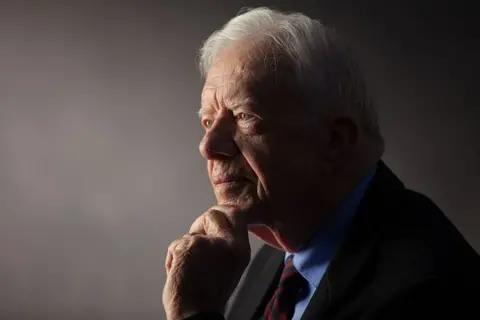 Getty Images
Getty ImagesCarter also was one of the first modern US presidents to grapple with an issue that has become an undeniable political reality for every one of his successors – the American public’s often debilitating distrust of US government and institutions.
Carter, in a July 1979 speech, called it a “crisis of confidence”.
“Our people are losing that faith, not only in government itself but in the ability as citizens to serve as the ultimate rulers and shapers of our democracy,” he said.
Public trust in his government to do the right thing at least “most of the time” was at 34% at the start of his presidency and dropped to 27% in March 1980, according to the Pew Research Center. That number has climbed above 50% only once since Carter – in the month after the September 11, 2001, attacks.
For a time it may have seemed like the public’s low esteem in the Carter years was a consequence of the immediate aftermath of Richard Nixon’s Watergate scandal, when those net approval numbers first dipped into negative territory.
The reality, however, is that a lack of faith in government is now a fact of life in American politics. During the Donald Trump presidency, the percent of the public that believed the government would do the right thing regularly registered in the high teens. Biden was unable to reverse this trend during his time in office – a fact that Trump was able to turn against the man who defeated him in his relentless march back to the White House.
It is difficult to avoid comparisons between Carter and the most recent one-term president, Biden.
It’s something twice-winner Trump frequently invites. His political views were crystallised in the 1970s and 1980s and he sometimes references Carter as a way to needle Democrats.
“I see that everybody is comparing Joe Biden to Jimmy Carter,” Trump wrote in one of his tweet-like press releases in 2021. “It would seem to me that is very unfair to Jimmy Carter. Jimmy mishandled crisis after crisis, but Biden has created crisis after crisis.”
Carter himself was not silent about the 45th president, telling the Washington Post that Trump was a disaster “in human rights and taking care of people and treating people equal”.
At the very least, the two make for an interesting contrast. Both were political upstarts who won their presidential terms against high odds. Both struggled with insider Washington politics.
 Getty Images
Getty ImagesCarter sought to serve in the White House with humility. He wore cardigan sweaters, carried his own luggage on Air Force One and prohibited the presidential anthem Hail to the Chief being played when he entered the room. Trump seemed to relish the pageantry and trappings of power, from the lavish Fourth of July celebrations to using Air Force One as a backdrop for his re-election rallies.
Then there is the post-presidency – or, in Trump’s case, a presidential interregnum. Following his re-election loss, Carter returned to his two-bedroom house in Plains, Georgia. He withdrew from domestic politics and worked on charities such as Habitat for Humanity. He founded the Carter Center, tasked with combating global diseases, promoting human rights and serving as an independent monitor for democratic elections. In 2002, he won a Nobel Peace Prize.
Trump spent his immediate post-presidency fixated on disputing his 2020 election defeat and setting the stage for his 2024 presidential campaign. His election win and now imminent return to the White House was a plot twist that Carter never publicly contemplated, as he decisively closed the door behind him when he left office.
Carter was only 56 when he left the White House, and his obituaries reflect as much his accomplishments after his time in office as during it. And they are also a reflection of how America has changed in four decades – and how much it hasn’t.

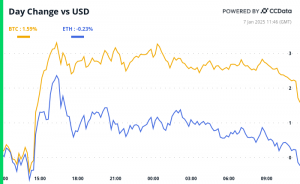











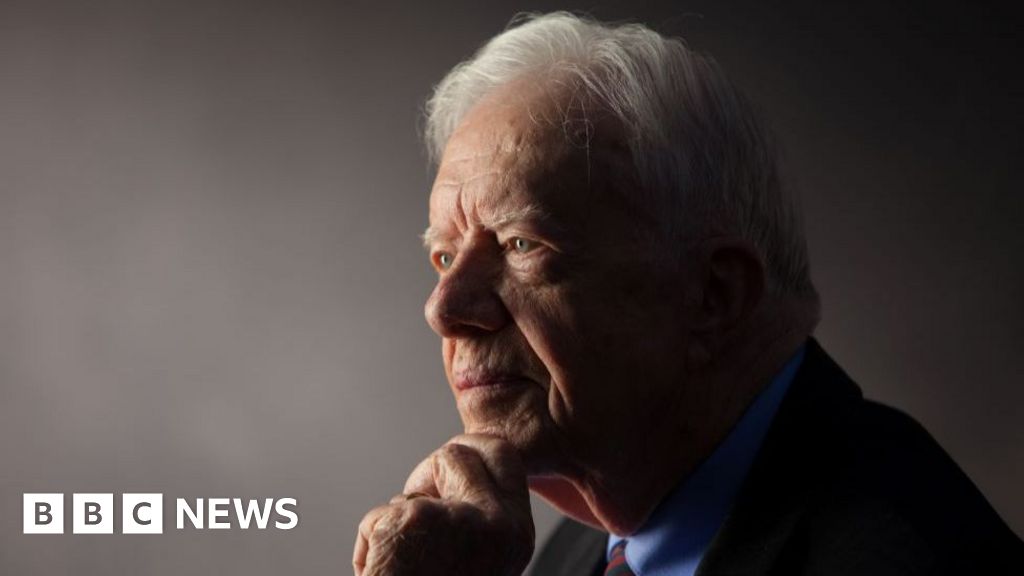




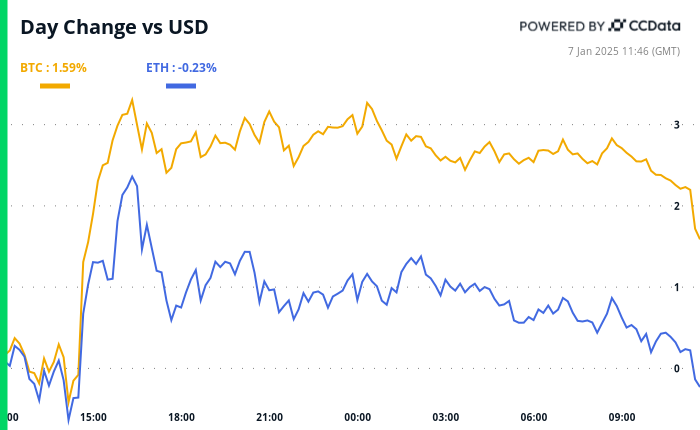
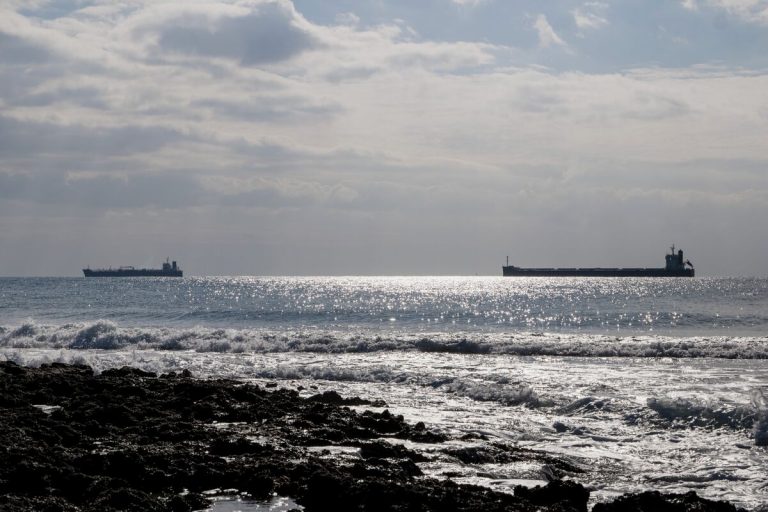






+ There are no comments
Add yours